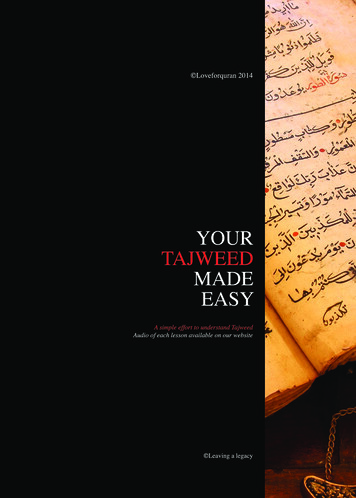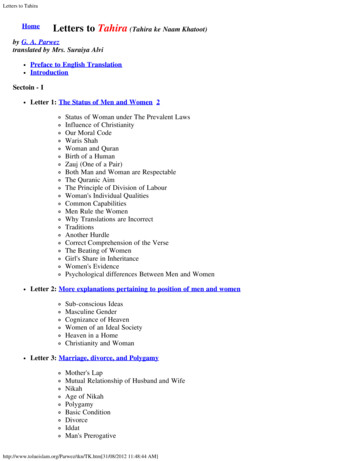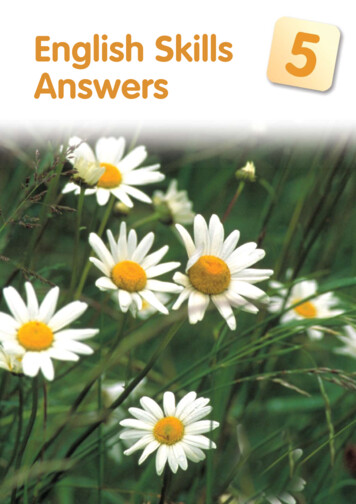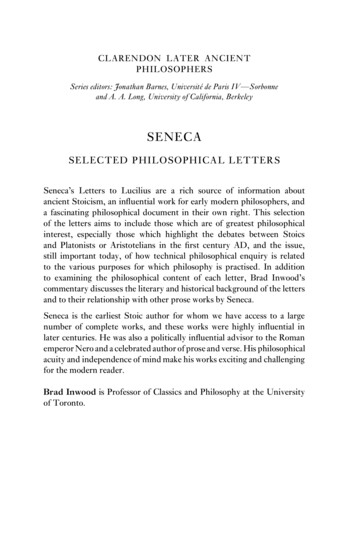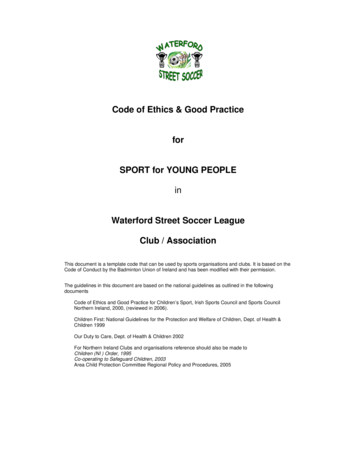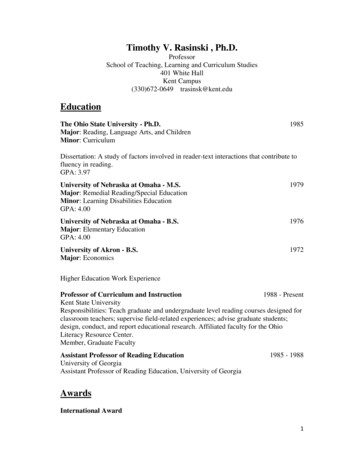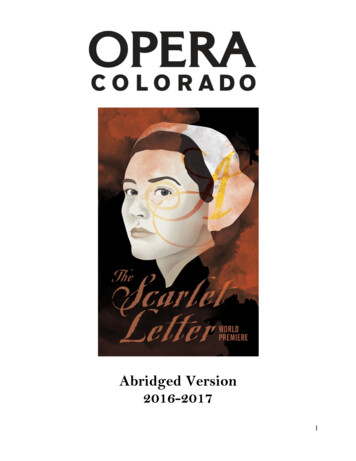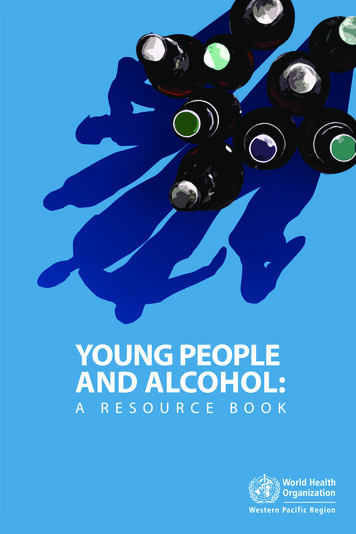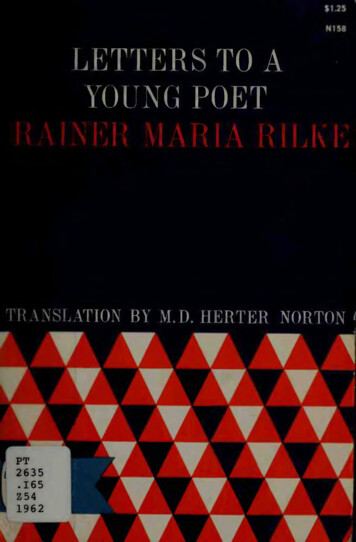
Transcription
LETTERS TO AYOUNG POETHAIN ER MARIA RILKETRANSLATION BY M.D. HERTER NORTON 'PTI 2635.165Z541962
N E W C ö i-IL 'SO- Ctil' . ? i:j o r n s a' . LTS A N F R A N C IS C O , C A L IF O R N IA 0 4 1 0 2(4 i 5 ) 6 2 5 - 4 2 I Zwas bom in Prague in 1875 , the son of a conventionalarmy-officer father and a religious-fanatical mother, who firstsent him, most unsuitably, to military school. After that, largelyautodidact, he studied philosophy, history, literature, art, inPrague, Munich, Berlin. From his earliest years he wrote verse.In the ’90s both Erste and Frühe Gedichte appeared, short stories,plays. Much of his early work he declined to include in his col lected works. In 1899 (which saw the Cornet, first version)came the first of two trips to Russia with Lou Andreas-Salome(Vom lieben Gott und Anderes, later to be called Geschichtenvom Lieben Gott, appeared in December 1900 ). He married ClaraWesthoff in 19 0 1 , lived in Worpswede till the birth of their onlychild, Ruth, moving to Paris in 1902 , Clara to work with Rodin,Rilke to write his monograph on him. Between travels in Ger many, France, Italy, Spain, Egypt, Scandinavia, and his prodigiousletter-writing, the twelve years with Pans as base were produc tive: Stundenbuch, Buch der Bilder, Neue Gedichte, Notebooksof M. L. Brigge, translations of E. B. Browning, Gide, de Guerin.After the outbreak of World War I he lived mostly in Munich,served briefly in army office work in Vienna, and in 19 x9 went toSwitzerland. Here, in the small stone tower of Muzot, he achievedin 1922 the Duineser Elegien and the Sonette an Orpheus, fol lowed by poems in French and translations of Valery and others.He died at Valmont near Glion on December 29, 1926 , and isburied beside the little church of Raron overlooking the RhoneValley.R ilk e
RAINER MARIA RILKEIn Translations by M. D. HerterNo rto nLetters to a Young PoetSonnets to OrpheusWartime Letters of Rainer Maria R il\eTranslations from the Poetry of Rainer Maria Rilf eThe Lay of //. Love and Death of Cornet Christopher RilfyeThe Notebooks of Malte Laurids BriggeStories of GodTranslated b y S t e p h e n S p e n d e r and J. B. Le is h m a nDuino ElegiesTranslated by J a n e B a n n a r d G r e e n e and M. D . HerterNLetters of Rainer Maria R il{eVolume One, 1892-1910Volume Tw o, 1910-1926o rto n
LETTERSTO A Y O U N GPOETGRsaincr Jviaria RjlkcT R A N S L A T I O N BY M. D. H E R T E R N O R T O NREVISEDEDITIONoooooooooooooooooooooooooo ' 3/ 00000Hew York W W NORTON & COMPANY INC
COPYRIGHT1934BY W . W . NORTON & COM PANY, INC.RENEW ED 1962 BY M . D. HERTER NORTONREVISED EDITION COPYRIGHT 1954 BYW . W . NORTON & COM PANY, INC.ISBNP R IN T E DINTHE0393U N IT E D00158XSTATES0OFA M E R IC A
ContentsTRANSLATOR’S N O TE7IN TRO D U CTIO N9THE LETTERS15C H RO N IC LE, 1903-1908795
Translators J\[oteHow these letters came to be written is told bytheir recipient in his introduction, and to this therewould be nothing to add were it not for the closeof the eighth letter: Do not believe that he whoseeks to comfort you lives untroubled among thesimple and quiet words that sometimes do yougood. His life has much difficulty and sadness. . . Were it otherwise he would never have beenable to find those words.” It is evident that a greatartist, whatever the immediate conditions disturb ing his own life, may be able to clarify for thebenefit of another those fundamental truths theconviction of which lies too deep in his conscious ness to be reached by external agitations. ThoughRilke expresses himself with a wisdom and a kind ness that seem to reflect the calm of self-possession,his spirit may have been speaking out of its ownneed rather than from the security of endsachieved, so that his words indeed reflect desirerather than fulfillment. In what sort this was the7
case becomes apparent on perusal of the severalvolumes of his correspondence. From these, for themost part, the accompanying chronicle of theyears 1903-1908 has been prepared. It shows whatRilke was going through in his own relationshipto life and work at the period in question (heturned twenty-eight in December, 1903). Perhapssuch a record may in a measure explain, too, whysympathy was always so responsive an element ofhis nature. Certainly—despite low physical vitalitythat often reduced him to actual ill-health, despitelack of funds and homeless wandering in search ofthe right places and circumstances for his work,despite all the subjective fret and hindrance be cause of which some think to see in him a mor bidly conditioned fantasy—the legend of theweary poet is dispelled, and in the end we findhim always young, always constructive, the emi nently positive philosopher of these letters.New York, October, 1934In revising the text for the present edition thetranslator is indebted to Herbert Steiner for manyhelpful criticisms and suggestions.Washington, D.C., February, 1954
Introduction
Introductionin the late autumn of 1902— I was sittingunder some ancient chestnuts in the park of theMilitary Academy in Wiener-Neustadt, reading. Sodeeply was I absorbed in my book, I scarcelynoticed when the only civilian among our profes sors, the Academy’s learned and kindly ParsonHoracek, came to join me. He took the volumefrom my hand, contemplated the cover, and shookhis head. “Poems of Rainer Maria Rilke?’ he askedreflectively. He then turned the pages here andthere, skimmed a couple of verses, gazed thought fully into the distance, and finally nodded. “So ourpupil René Rilke has become a poet.” And I learned of the thin, pale boy, whom hisparents had sent more than fifteen years ago to theLower Military School at Sankt-Pôlten so that hemight later become an officer. Horacek had beenchaplain to that institution at the time, and hestill remembered his former student perfectly. Hedescribed him as a quiet, serious, highly endowedItw as11
boy, who liked to keep to himself, patiently en dured the compulsions of boarding-school life andafter his fourth year moved on with the others intothe Military College, which was situated atMahrisch-Weisskirchen. Here indeed it becameapparent that his constitution could not stand thestrain, for which reason his parents removed himfrom the school and let him continue his studiesat home in Prague. How the course of his life hadsince shaped itself Horacek could not say.After all this it is not hard to understand howI determined in that very hour to send my poeticattempts to Rainer Maria Rilke and to ask him forhis opinion- Not yet twenty, and close on thethreshold of a profession which I felt to be en tirely contrary to my inclinations, I hoped to findunderstanding, if in any one, in the poet who hadwritten Mir zur Feier. And without having in tended to do so at all, I found myself writing acovering letter in which I unreservedly laid baremy heart as never before and never since to anysecond human being.Many weeks passed before a reply came. Theblue-sealed letter bore the postmark of Paris,weighed heavy in the hand, and showed on theenvelope the same beautiful, clear, sure characters12
in which the text was set down from the first lineto the last With it began my regular correspond ence with Rainer Maria Rilke which lasted until190S and then gradually petered out because lifedrove me off into those very regions from whichthe poet’s warm, tender and touching concernhad sought to keep me.But that is not important Only the ten lettersare important that follow here, important for an un derstanding of the world in which Rainer MariaRilke lived and worked, and important too formany growing and evolving spirits of today andtomorrow. And where a great and unique manspeaks, small men should keep silence.F ranz X aver K a ppu sBerlin, June 192913
The Letters
OmParis, February 17th, 1903M Y DEAR SIR,Y o u r l e t t e r only reached me a few days ago.I want to thank you for its great and kind confi dence. I can hardly do more. I cannot go into thenature of your verses; for all critical intention istoo far from me. With nothing can one approacha work of art so little as with critical words: theyalways come down to more or less happy misunder standings. Things are not all so comprehensibleand expressible as one would mostly have us be lieve; most events are inexpressible, taking place ina realm which no word has ever entered, and moreinexpressible than all else are works of art, mys terious existences, the life of which, while ourspasses away, endures.After these prefatory remarks, let me only tellyou further that your verses have no individualstyle, although they do show quiet and hidden17
beginnings of something personal. I feel this mostclearly m the last poem, "My Soul." There some thing of your own wants to come through to wordand melody. And in the lovely poem “To Leopardi1'there does perhaps grow up a sort of kinship withthat great solitary man. Nevertheless the poems arenot yet anything on their own account, nothing in dependent, even the last and the one to Leopardi.Your kind letter, which accompanied them, doesnot fail to make clear to me various shortcomingswhich I felt in reading your verses without howeverbeing able specifically to name them.You ask whether your verses are good. You askme. You have asked others before. You send themto magazines. You compare them with other poems,and you are disturbed when certain editors rejectyour efforts. Now (since you have allowed me toadvise you) I beg you to give up all that. Youare looking outward, and that above all you shouldnot do now. Nobody can counsel and help you,nobody. There is only one single way. Go intoyourself. Search for the reason that bids you write;find out whether it is spreading out its roots in thedeepest places of your heart, acknowledge to your self whether you would have to die if it were de nied you to write. This above all—ask yourself in18
the stillest hour of your night: must I write? Delveinto yourself for a deep answer. And if thisshould be affirmative, if you may meet this earnestquestion with a strong and simple ‘7 m ust” thenbuild your life according to this necessity; your lifeeven into its most indifferent and slightest hourmust be a sign of this urge and a testimony to itThen draw near to Nature. Then try, like some firsthuman being, to say what you see and experienceand love and lose. Do not write love-poems; avoidat first those forms that are too facile and com monplace: they are the most difficult, for it takesa great, fully matured power to give something ofyour own where good and even excellent traditionscome to mind in quantity. Therefore save yourselffrom these general themes and seek those whichyour own everyday life offers you; describe yoursorrows and desires, passing thoughts and the be lief in some sort of beauty—describe all these withloving, quiet, humble sincerity, and use, to expressyourself, the things in your environment, the im ages from your dreams, and the objects of yourmemory. If your daily life seems poor, do notblame it; blame yourself, tell yourself that you arenot poet enough to call forth its riches; for to thecreator there is no poverty and no poor indifferent19
place. And even if you were in some prison thewalls of which let none of the sounds of the worldcome to your senses—would you not then stillhave your childhood, that precious, kingly posses sion, that treasure-house of memories? Turn yourattention thither. Try to raise the submerged sen sations of that ample past; your personality willgrow more firm, your solitude will widen and willbecome a dusky dwelling past which the noise ofothers goes by far away.— And if out of this turn ing inward, out of this absorption into your ownworld verses come, then it will not occur to you toask anyone whether they are good verses. Nor willyou by to interest magazines in your poems: foryou will see in them your fond natural possession,a fragment and a voice of your life. A work of artis good if it has sprung from necessity. In this na ture of its origin lies the judgment of it: there isno other. Therefore, my dear sir, I know no advicefor you save this: to go into yourself and test thedeeps in which your life takes rise; at its sourceyou will find the answer to the question whetheryou must create. Accept it, just as it sounds, with out inquiring into it. Perhaps it will turn out thatyou are called to be an artist. Then take thatdestiny upon yourself and bear it, its burden and20
its greatness, without ever asking what recompensemight come from outside. For the creator must bea world for himself and find everything in himselfand in Nature to whom he has attached himself.But perhaps after this descent into yourself andinto your inner solitude you will have to give upbecoming a poet; (it is enough, as I have said, tofeel that one could live without writing: then onemust not attempt it at all). But even then thisinward searching which I ask of you will not havebeen in vain. Your life will in any case find its ownways thence, and that they may be good, rich andwide I wish you more than I can say.What more shall I say to you? Everything seemsto me to have its just emphasis; and after all I doonly want to advise you to keep growing quietlyand seriously throughout your whole develop ment; you cannot disturb it more rudely than bylooking outward and expecting from outside re plies to questions that only your inmost feelingin your most hushed hour can perhaps answer.It was a pleasure to me to find in your letter thename of Professor Horacek; I keep for that lovableand learned man a great veneration and a grati tude that endures through the years. Will you,please, tell him how I feel; it is very good of him21
still to think of me, and I know how to appreciateit.The verses which you kindly entrusted to me Iam returning at the same time. And I thank youonce more for your great and sincere confidence,of which I have tried, through this honest answergiven to the best of my knowledge, to make myselfa little worthier than, as a stranger, I really am.Yours faithfully and with all sympathy:R a i n e r M a r ia R i l k e22
TwoViareggio, near Pisa (Italy),April 5th, 1903You m u s t forgive me, my dear sir, for only todaygratefully remembering your letter of February24th: I have been unwell all this time, not exactlyill, but oppressed by an influenza-like lassitude thathas made me incapable of anything. And finally, asI simply did not get better, I came to tins southerlysea, the beneficence of which has helped me oncebefore. But I am not yet well, writing comes hard tome, and so you must take these few lines for more.Of course you must know that every letter ofyours will always gi e me pleasure, and only bearwith the answer which will perhaps often leaveyou empty-handed; for at bottom, and just in thedeepest and most important things, we are unutter ably alone, and for one person to be able to advise23
or even help another, a lot must happen, a lot mustgo well, a whole constellation of things must comeright in order once to succeed.Today I wanted to tell you just two things more:Irony: Do not let yourself be governed by it,especially not in uncreative moments. In creativemoments try to make use of it as one more meansof grasping life. Cleanly used, it too is clean, andone need not be ashamed of it; and if you feel youare getting too familiar with it, if you fear thisgrowing intimacy with it, then turn to great andserious objects, before which it becomes small andhelpless. Seek the depth of things: thither ironynever descends—and when you come thus closeto the edge of greatness, test out at the sametime whether this ironic attitude springs from anecessity of your nature. For under the influenceof serious things either it will fall from you (ifit is something fortuitous), or else it will (if itreally innately belongs to you) strengthen into astern instrument and take its place in the seriesof tools with which you will have to shape your art.And the second point about which I wanted totell you today is this:Of all my books just a few are indispensable to24
me, and two even are always among my things,wherever I am. They are about me here too: theBible, and the books of the great Danish writer,Jens Peter Jacobsen. I wonder whether you knowhis works. You can easily get them, for some ofthem have come out in very good translation inReclam’s Universal Library. Get yourself the littlevolume of Six Stories of J. P. Jacobsen and hisnovel Niels Lyhne, and start on the first story inthe former, called “Mogens.” A world will comeover you, the happiness, the abundance, the in comprehensible immensity of a world. Live awhile in these books, learn from them what seemsto you worth learning, but above all love themThis love will be repaid you a thousand and athousand times, and however your life may turn,—it will, I am certain of it, run through the fabric ofyour growth as one of the most important threadsamong all the threads of your experiences, disappointments and joys.If I am to say from whom I have learned some thing about the nature of creative work, about itsdepth and everlastingness, there are but two namesI can mention: that of Jacobsen, the great, greatwriter, and that of Auguste Rodin, the sculptor,25
who has not his equal among all artists living to day.And all success upon your wayslYours:R a i n e r M a r ia R i l k e26
ThreeViareggio, near Pisa (Italy),April 23rd, 1903You g a v e me much joy, my dear sir, with yourEaster letter; for it said many good things aboutyourself, and the way you spoke of Jacobsen'sgreat and beloved art showed me that I had noterred in guiding your life and its many questionsto this source of plenty,Now Niels Lyhne will open up before you, abook of glories and of the deeps; the oftener onereads it—there seems to be everything in it fromlife’s very faintest fragrance to the full big tasteof its heaviest fruits. There is nothing that does notseem to have been understood, grasped, experi enced and recognized in the tremulous after-rftigof memory; no experience has been too slight, andthe least incident unfolds like a destiny, and fateitself is like a wonderful, wide web in which eachthread is guided by an infinitely tender hand and27
laid alongside another and held and borne up bya hundred others. You will experience the greathappiness of reading this book for the first time,and will go through its countless surprises as in anew dream. But I can tell you that later too onegoes through these books again and again with thesame astonishment and that they lose none of thewonderful power and surrender none of the fabu lousness with which they overwhelm one at a firstreading.One just comes to relish them increasingly, to bealways more grateful, and somehow better andsimpler in one’s contemplating, deeper in one’sbelief in life, and in living happier and bigger.And later you must read the wonderful bookof the destiny and desire of Marie Grubbe andJacobsen’s letters and pages from his diary andfragments and finally his poems, which (even ifthey are only fairly well translated) live in ever lasting sound. (For this purpose I would adviseyou to buy when you have a chance the beautifulcomplete edition of Jacobsen’s works which con tains all these. It appeared in three volumes, welltranslated, brought out by Eugen Diederichs inLeipzig, and costs, I believe, only 5 or 6 marks avolume.)28
In your opinion of “There should have beenroses . .( that work of such incomparable deli cacy and form) you are of course quite, quiteimassailably right as against the writer of theintroduction. And let me here promptly make arequest: read as little as possible of aestheticcriticism—such things are either partisan views,petrified and grown senseless in their lifeless in duration, or they are clever quibblings in whichtoday one view wins and tomorrow the opposite.Works of art are of an infinite loneliness and withnothing so little to be reached as with criticism.Only love can grasp and hold and be just towardthem. Consider yourself and your feeling rightevery time with regard to every such argumenta tion, discus? ion or introduction; if you are wrongafter all, the natural growth of your inner life willlead you slowly and with time to other insights.Leave to your opinions their own quiet undis turbed development, which, like all progress, mustcome from deep within and cannot be pressed orhurried by anything. Everything is gestation andthen bringing forth. To let each impression andeach germ of a feeling come to completion whollyin itself, in the dark, in the inexpressible, the un conscious, beyond the reach of one’s own intelli-29
gence, and await with deep humility and patiencethe birth-hour of a new clarity: that alone is livingthe artists life: in understanding as in creating.There is here no measuring with time, no yearmatters, and ten years are nothing. Being an artistmeans, not reckoning and counting, but ripeninglike the tree which does not force its sap and standsconfident in the storms of spring without the fearthat after them may come no summer. It doescome. But it comes only to the patient, who arethere as though eternity lay before them, so uncon cernedly still and wide. I learn it daily, learn itwith pain to which I am grateful: patience is every thing!His books affect me (and,incidentally, so does the man whom I know cas ually) in such a manner that when I have foundone of his beautiful pages I am always afraid ofthe next, which may upset everything again andturn what is attractive into something unworthy.You characterized him very well with the term:"living and writing in heat.”— And in fact artisticexperience lies so incredibly close to that of sex,to its pain and its ecstasy, that the two manifesta tions are indeed but different forms of one and thesame yearning and delight And if instead of heatR ic h a r d D e h m30el:
one might say—sex, sex in the great, broad, cleansense, free of any insinuation of ecclesiastical error,then his art would be very grand and infinitely im portant. His poetic power is great, strong as aprimitive instinct; it has its own unyieldingrhythms in itself and breaks out of him as out ofmountains.But it seems that this power is not alwayshonest and without pose. (But this again is oneof the hardest tests of the creative individual: hemust always remain unconscious, unsuspecting ofhis best virtues, if he would not rob them of theiringenuousness and untouchedness!) And then,where, as it rushes through his be ng, it comes tothe sexual, it finds not quite so pure a man as itmight require. Here is no thoroughly mature andclean sex world, but one that is not sufficientlyhuman, that is only male, is heat, intoxication andrestlessness, and laden with the old prejudices andarrogances with which man has disfigured and bur dened love. Because he loves as m,?.n only, not ashuman being, for this reason there is in his sexualfeeling something narrow, seeming wild, spiteful,time-bound, uneternal, that diminishes his art andmakes it ambiguous and doubtfuL It is not im maculate, it is marked by time and by passion, andlittle of it will survive and endure. (But most art is31
like that!) Nevertheless one may deeply rejoicein what there is of greatness in it, only one mustnot lose oneself in it and become an adherent ofthat Dehmelian world which is so unspeakablyapprehensive, full of adultery and confusion, andso far from the real destinies that cause more suffer ing than these temporal afflictions but alsc givemore opportunity for greatness and more couragefor eternity.Finally, as to my books, I would like best tosend you all that might give you pleasure. But Iam very poor, and my books, when once they haveappeared, no longer belong to me. I cannot buythem myself—and, as I would so often like, givethem to those who would be kind to them.So I am writing you on a slip the titles (andpublishers) of my most recent books (the latest,in all I believe I have published some 12 or 13)and must leave it to you, dear sir, to order someof them when occasion offers.I like to think of my books as in your possession.Farewell.Yours:R a i n e r M a r ia R i l e32
FourWorpswede, near Bremen,July 16th, 1903S o m e t e n days ago I left Paris, quite ill andtired, and journeyed into a great northerly plainwhose breadth and stillness and sky are to makeme well again. But I came into a long spell of rainthat today for the first time shows signs of clear ing a little over the restlessly wind-blown land;and I am using this first moment of brightness togreet you, dear sir.Very dear Mr. Kappus: I have left a letter fromyou long unanswered, not that I had forgotten it—on the contrary: it was of the sort that one readsagain, when one finds them among one’s corre spondence, and I recognized you in it as thoughyou had been close at hand. It was the letter ofMay 2nd, and you surely remember it. When Iread it, as now, in the great quiet of these dis tances, I am touched by your beautiful concernS3
about life, more even than I had felt it in Paris,where everything resounds and dies away differ ently because of the too great noise that makesthings vibrate. Here, where an immense countrylies about me, over which the winds pass comingfrom the seas, here I feel that no human beinganywhere can answer for you those questions andfeelings that deep within them have a life of theirown; for even the best err in words when theyare meant to mean most delicate and almost in expressible things. But I believe nevertheless thatyou will not have to remain without a solution ifyou will hold to objects that are similar to thosefrom which my eyes now draw refreshment If youwill cling to Nature, to the simple in Nature, tothe little things that hardly anyone sees, and thatcan so unexpectedly become big and beyondmeasuring; if you have this love of inconsiderablethings and seek quite simply, as one who serves, towin the confidence of what seems poor: theneverything will become easier, more coherent andsomehow more conciliatory for you, not in yourintellect perhaps, which lags marveling behind,but in your inmost consciousness, waking andcognizance. You are so young, so before all be ginning, and I want to beg you, as much as I can,34
dear sir, to be patient toward all that is unsolvedin your heart and to try to love the questions them selves like locked rooms and like books that arewritten in a very foreign tongue. Do not now seekthe answers, which cannot be given you becauseyou would not be able to live them. And the pointis, to live everything. Live the questions now. Per haps you will then gradually, without noticing it,live along some distant day into the answer. Per haps you do carry within yourself the possibility ofshaping and forming as a particularly happy andpure way of living; train yourself to it—but takewhatever comes with great trust, and if only itcomes out of your own will, out of some need ofyour inmost being, take it upon yourself and hatenothing. Sex is difficult; yes. But they are difficultthings with which we have been char red; almosteverything serious is difficult, and everything isserious. If you only recogLize this and manage,out of yourself, out of your own nature and ways,out of your own experience and childhood andstrength to achieve a relation to sex wholly yourown ( not influenced by convention and custom),then you need no longer be afraid of losing your self and becoming unworthy of your best posses sion.35
Physical pleasure is a sensual experience nodifferent from pure seeing or the pure sensationwith which a fine fruit fills the tongue; it is agreat unending experience, which is given us, ablowing of the world, the fullness and the gloryof all knowing. And not our acceptance of it isbad; the bad thing is that most people misuse andsquander this experience and apply it as a stimu lant at the tired spots of their lives and as distrac tion instead of a rallying toward exalted moments.Men have made even eating into some tiling else:want on the one hand, superfluity upon the other,have dimmed the distinctness of this need, and allthe deep, simple necessities in which life renewsitself have become similarly dulled. But the in dividual can clarify them for himself and live themclearly (and if not the individual, who is too de pendent, then at least the solitary man). He canremember that all beauty in animals and plantsis a quiet enduring form of love and longing, andhe can see animals, as he sees plants, patiently andwillingly uniting and increasing and growing, notout of physical delight, not out of physical suffer ing, but bowing to necessities that are greater thanpleasure and pain and more powerful than willand withstanding. O that man might take this86
secret, of which the world is full even to its littlestthings, more humbly to himself and bear it, endureit, more seriously and feel how terribly difficult itis, instead of taking it lightly. That he might bemore reverent toward his fruitfulness, which isbut one, whether it seems mental or physical; forintellectual creation too springs from the physical,is of one nature with it and only like a gentler,more ecstatic and more everlasting repetition ofphysical delight “The thought of being creator, ofprocreating, of making’* is nothing without itscontinuous great confirmation and realization inthe world, nothing without the thousandfold con cordance from things and animals—and enjoy ment of it is so indescribably beautiful and richonly because it is full of inherited memories ofthe begetting and the bearing of millions. In onecreative thought a thousand forgotten nights oflove revive, filling it with sublimity and exaltation.And those who come together in the night andare entwined in rocking delight do an earnest workand gather sweetnesses, gather depth and strengthfor the song of some coming poet, who will ariseto speak of ecstasies b
NEW Cöi-IL ' - C :j o r n s a SO til' _ . ? i ' . LT SAN FRANCISCO, C ALIFO R N IA 04102 (4 i 5) 625-42 I Z R ilk e was bom in Prague in 1875, the son of a conventional army-officer father and a religious-fanatical mother,
